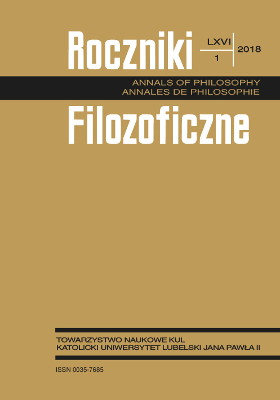Irracjonalność jako argument przeciwko idealizmowi. Transcendentalizm Kanta i Husserla w świetle rozumienia irracjonalności Hartmanna
Irrationality as an Argument against Idealism: Kant’s and Husserl’s Transcendentalism in the Light of Hartmann’s Understanding of Irrationality
Author(s): Piotr ŁaciakSubject(s): Philosophy, History of Philosophy, Philosophical Traditions, Metaphysics, Early Modern Philosophy, 19th Century Philosophy, Phenomenology, Ontology
Published by: Towarzystwo Naukowe KUL & Katolicki Uniwersytet Lubelski Jana Pawła II
Keywords: phenomenology; metaphysics of cognition; constitution of world; idealism;transcendental subjectivity;
Summary/Abstract: The article presents Kant’s and Husserl’s philosophies with reference to Hartmann’s understanding of irrationality. In Hartmann’s metaphysics of cognition, irrationality, which corresponds with partial unknowability of being, appears to be an argument against idealism that assumes a complete rationality of our knowledge and its object. In this article the author shows that it is possible to indicate similarities between Kant’s idea of the unknowability of the transcendental object, Husserl’s conception of the transcendental constitution of the world, and Hartmann’s concept of gnoseological irrationality. In Kant’s transcendentalism, irrationality implies an asymmetry between the conditions of the possibility of experience and the conditions of the possibility of the objects of experience, because the unknowability of a transcendental object and a thing in itself indicates that not all conditions of the objects are at the same time conditions of the possibility of experience. According to Husserl, transcendental subjectivity is not a sufficient reason for the world in its Dasein and Sosein, because the fact of the constitution of the world is an irrational one and it cannot be derived from the essence of subjectivity. The author tries to demonstrate that this analogy between Husserl and Hartmann, in the question of the irrationality, opens new interpretational possibilities for the relation between transcendental phenomenology and Hartmann’s philosophy.
Journal: Roczniki Filozoficzne
- Issue Year: 66/2018
- Issue No: 1
- Page Range: 33-49
- Page Count: 17
- Language: Polish

